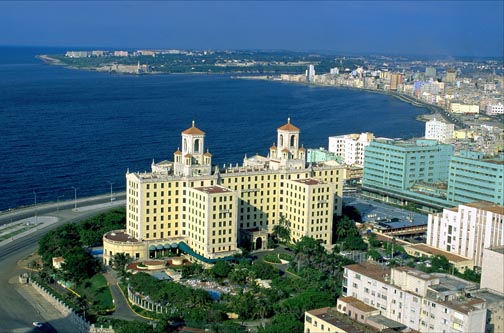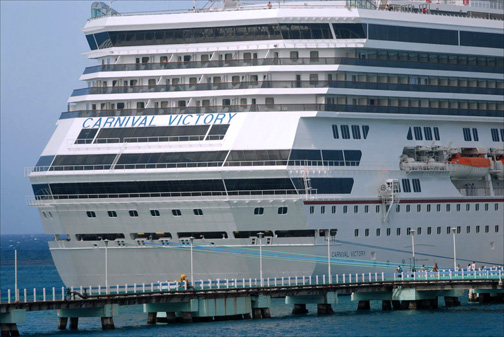Cuba opening poses challenge, prospects for Puerto Rico

The White House’s announcement Wednesday of charting a “new course” in its relations with Cuba drew immediate response from decision- and opinion-makers in Puerto Rico, which agreed for the most part that pulling the neighboring island country out of its isolated state will present challenges and opportunities in years to come.
“Puerto Rico should see the imminent opening of Cuba rather than as a challenge, as an opportunity,” said Waleska Rivera, president of the Puerto Rico Manufacturers Association.
“As part of our hemispheric agenda, the PRMA anticipated this event and has been working proactively to educate and train partners on the opportunities presented,” she added.
“We agree with the message [Cuban President] Raúl Castro presented today when announcing the opening of relations with the United States: ‘We must learn the art of living in a civilized manner with our differences’,” she said. “This is also important more than for economic reasons, but for humanitarian reasons.”
President Barack Obama made the historic announcement at about 1 p.m. Wednesday, saying among other things, “it is clear that decades of U.S. isolation of Cuba have failed to accomplish our enduring objective of promoting the emergence of a democratic, prosperous, and stable Cuba.”
“At times, longstanding U.S. policy toward Cuba has isolated the United States from regional and international partners, constrained our ability to influence outcomes throughout the Western Hemisphere, and impaired the use of the full range of tools available to the United States to promote positive change in Cuba. Though this policy has been rooted in the best of intentions, it has had little effect — today, as in 1961, Cuba is governed by the Castros and the Communist party.”
“We cannot keep doing the same thing and expect a different result. It does not serve America’s interests, or the Cuban people, to try to push Cuba toward collapse,” Obama said, outlining the U.S. government’s updated policy toward Cuba that should begin to kick in sometime next year.
The measures include: establishing diplomatic relations with Cuba; Adjusting regulations to more effectively empower the Cuban people; Facilitating an expansion of travel under general licenses for the 12 existing categories of travel to Cuba authorized by law; Facilitating remittances to Cuba by U.S. residents; Authorizing expanded commercial sales/exports from the United States of certain goods and services; Authorizing American citizens to import additional goods from Cuba; Facilitating authorized transactions between the United States and Cuba; Initiating new efforts to increase Cubans’ access to communications and their ability to communicate freely; and, Updating the application of Cuba sanctions in third countries, among other steps. (To read the full statement, click HERE.)
Capitalizing on strengths
In the wake of the announcement, local executives said Puerto Rico must now capitalize on its competitive strengths, namely its bilingual skills and knowledge of the U.S. and Latin American business cultures, as well as the experience with federal regulations.
However, Puerto Rico still needs to strengthen its production capacity to serve the local market, as well as its exports culture.
“The PRMA is committed to promoting exports and inserting Puerto Rico in international markets,” the PRMA’s Rivera said. “Over the years, we’ve supported initiatives to establish a prosperous regional economy in the Caribbean and the Americas.”
Meanwhile, José Izquierdo, president of the Puerto Rico Chamber of Commerce, agreed that Puerto Rican firms, especially the smaller ones, need to learn how to export and get over the fear of taking the risk.
“We have to learn how to export, beyond what is being done by multinational firms,” said Izquierdo. “Under these new rules, we’ll be organizing a workgroup to analyze them and see how Puerto Rican companies can make the most of the opportunities coming our way.”
For Izquierdo, who has worked both in the public and private sectors, the limited opening of Cuba should not represent a “calamity” for Puerto Rico, which he said is well-positioned today as a result of the Free Trade Agreements that have been signed in recent years.
“If this had happened 20 years ago, the impact would have been much greater because the FTA’s didn’t exist,” he said. “The agreements have opened commercial doors to dozens of countries, and Puerto Rico had to jump in and compete with them.”
“Now, Cuba’s limited opening makes it one of a dozen countries that have open relationships with the U.S., and Puerto Rico has to stand firm to remain competitive with all of those Latin American countries,” Izquierdo said.
Puerto Rico, he said, has competitive advantages that Cuba lacks and others, like the Dominican Republic are just starting to develop, namely compliance with federal regulations and exclusive distribution contracts throughout the Caribbean.
“There are a number of businesses that have exclusivity and if there’s a market for them in Cuba, Cuba will have to go through them to buy them,” he said.
As for tourism, an area where Cuba will likely compete head-on with Puerto Rico, easing travel rules could position the neighboring island nation as a “novelty,” said Clarisa Jiménez, CEO of the Puerto Rico Hotel and Tourism Association.
“It would certainly be a novelty and the novelty has its attractions. Although this applies more to the United States because Cuba was already open to the world,” she said.
“We have to compete with everyone. Not only with Cuba. Each destination has to find its place,” she said. “This is a great time to reinforce marketing plans and be more proactive in promoting Puerto Rico as a tourist destination. Certainly the Caribbean region gains an additional nuance and as a country located in the Caribbean, there are large areas of opportunity.”

Since taking office in 2009, President Obama has taken steps aimed at supporting the ability of the Cuban people to gain greater control over their own lives and determine their country’s future. (Credit: Larry Luxner)
Government officials weigh in
The announced easing of diplomatic relations between the U.S. and Cuba drew reactions from both Gov. Alejandro García-Padilla and Puerto Rico’s Resident Commissioner in Washington, Pedro Pierluisi.
“Once again, Obama proves he’s a modern, liberal president and he makes those of us who have trusted in him since day one look well once again,” García-Padilla said. “This is good for the U.S. and good for our sister Caribbean island Cuba.”
As far as the competitive threat posed by Cuba, he said it has been competing against Puerto Rico “for decades, and has no attractives that neither we, the Dominican Republic, nor other Caribbean islands lack. It is a competitor that will join the fray.”
“When the time comes, they will have to begin laying out infrastructure they don’t have to compete with us. We will make sure to make more advances,” he added.
“We will do our best to continue beating the competition and remain, as we have in recent months, the tourism capital of the Caribbean,” the governor said.
Meanwhile, Pierluisi placed his hope on the fact that “the reestablishment of diplomatic relations with Cuba … achieves both the democracy and freedom that our Cuban brethren need.”
“If there is something that I condemn, is the lack of democratic rights under our territorial status in Puerto Rico. And I have always supported the Cuban exile in his claim for these rights in Cuba,” he said.










